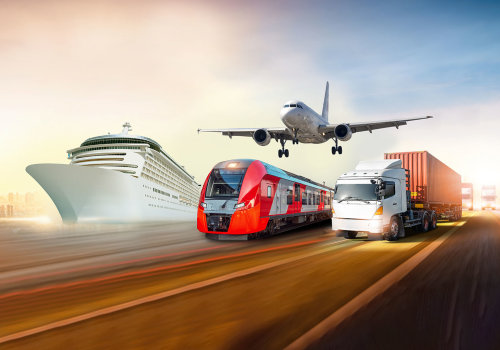The ferry is one of the oldest and most reliable forms of public transport. It has been around for centuries, connecting people and goods from one side of the world to the other. With modern technology, ferry services have become even more efficient and comfortable, providing a convenient and cost-effective way to travel. In this article, we will discuss the various benefits of ferry services and how they can help you get to where you need to go quickly, conveniently, and safely. Ferry services provide passengers with a wide range of advantages.
From scenic views to high-speed crossings, ferries offer a unique form of transportation that allows you to travel between destinations in comfort and style. Additionally, they are a great way to reduce your carbon footprint since they use significantly less energy than other forms of transportation. We will also explore how ferry services can be used to connect different parts of a city or region, or even to travel long distances between different countries. Finally, we'll look at the various safety measures that are in place to ensure that passengers can travel with peace of mind. Ferry services are a type of public transportation that offer a reliable and comfortable way to travel. They are vessels that transport passengers, vehicles, and cargo across bodies of water, such as rivers, lakes, seas, and oceans.
Ferry services are used for both short-distance trips and long-distance journeys, and they can provide an efficient way to travel between cities or islands.
Types of Ferry Services
Passenger ferries are the most common type of ferry service, and they are used to transport passengers between two points. These ferries usually have seating areas for passengers, as well as facilities such as restrooms, lounges, and onboard restaurants. Car ferries are designed to transport vehicles as well as passengers.These ferries usually have ramps that allow cars to drive onto the vessel and secure them in place for the duration of the journey. Cargo ferries are vessels that are used to transport goods such as food, fuel, building materials, and other items. These ferries usually have large cargo holds with specialized equipment for loading and unloading cargo.
Advantages of Using Ferry Services
Ferry services offer several advantages over other forms of public transportation.They provide an efficient way to travel between destinations that would otherwise be difficult to reach by land or air. Ferry services are also more environmentally friendly than other forms of transportation, as they use less fuel and create less pollution than cars or airplanes. Additionally, ferry services can be more convenient than other forms of transportation, as they provide a direct route between two points without the need for transfers or layovers.
Environmental Benefits
Ferry services can also help reduce pollution in cities by providing an alternative to cars and other motor vehicles.Ferries do not create emissions like cars do, so they can help reduce air pollution in cities. Additionally, ferry services can help reduce traffic congestion on roads, which can result in improved air quality in urban areas.
Convenience
Ferry services can provide a more convenient way to travel than other public transport options. Ferry routes often provide direct connections between two points without the need for transfers or layovers.Additionally, ferry services can be used to connect remote areas or islands with mainland cities, making it easier for people to access these destinations.
Safety Measures
Ferry services employ several safety measures to ensure a safe journey for passengers and crew. All vessels are equipped with lifeboats and other emergency equipment in case of an emergency situation. Additionally, crew members are trained in safety procedures and all vessels must undergo regular safety inspections before they can be approved for use.Ticketing OptionsFerry services offer several ticketing options that can help save money on fares. Discounts may be available for seniors, children, students, or military personnel, and tickets may be available for multiple trips or for round-trip journeys. Additionally, some ferry services offer group discounts for groups of 10 or more passengers.
Amenities
Most ferry services offer amenities such as onboard restaurants, shops, and entertainment to make the journey more enjoyable.Many ferries also have Wi-Fi access so passengers can stay connected during their journey. Additionally, some ferries offer sleeping cabins so passengers can rest during long-distance journeys.
Routes
Ferry services operate a variety of routes that connect cities or islands with each other. For example, ferries may connect two cities on opposite sides of a river or lake, or they may connect an island with a mainland city. Ferry routes may also be used to connect two cities on opposite sides of a bay or ocean.Conclusion
Ferry services offer a convenient and comfortable way to travel, providing reliable public transportation and connecting remote areas with mainland cities.As outlined in this article, ferry services come in different forms, such as passenger ferries, car ferries, and high-speed ferries, each providing its own set of benefits. Passengers can enjoy the comfort of traveling by ferry while avoiding traffic and enjoying the views of the surrounding area. Car ferries allow passengers to transport their vehicles with them, making it easier to reach their destination while saving time. High-speed ferries offer fast and efficient transportation between two locations, allowing passengers to quickly reach their destination in a fraction of the time it would take to drive. No matter which type of ferry service one chooses, they offer a great transportation option that provides a variety of benefits.
The Benefits of Ferry Services
Ferry services are a great option for public transportation, offering a reliable and comfortable way to travel. There are many benefits to taking ferries over other public transport options. For one, they are often more environmentally friendly than other forms of transportation. This is because ferries produce fewer emissions and less noise pollution than other forms of transport, such as cars or planes.In addition, ferry services can provide a convenient and comfortable way to travel that is often cheaper than other public transport options. Ferry services can also be used to connect remote areas or islands with mainland cities. This can be beneficial for both travelers and the communities they visit. Travelers can access more remote areas that would otherwise be inaccessible, while local communities can benefit from the influx of tourism. This connection helps local economies and can lead to increased employment opportunities. Finally, ferry services can provide a unique experience for travelers.
They offer stunning views of the coastline and can be a great way to relax and appreciate nature. Taking a ferry is a great way to explore a new area and make the most of your vacation or business trip. In conclusion, ferry services provide a convenient, affordable, and eco-friendly way to travel. They are a great option for commuters who need to connect between remote locations or islands with mainland cities. Ferry services also offer a comfortable and reliable mode of transportation, as well as reduced emissions and less noise pollution.
With all the advantages they offer, it is no wonder that ferry services are becoming an increasingly popular choice for public transportation.











Leave Message